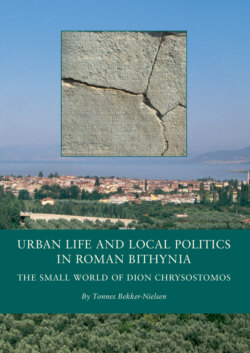Читать книгу Urban Life and Local Politics in Roman Bithynia - Tonnes Bekker-Nielsen - Страница 8
На сайте Литреса книга снята с продажи.
Formal and informal politics
ОглавлениеWe know a good deal about formal political life in ancient cities: the names of their leading magistrates as preserved in honorific and funerary inscriptions; visits by or delegations to the emperor; famous sons and daughters who reached high imperial positions; important decisions of their councils that were inscribed on stone for posterity. But we know very little about the day-to-day, face-to-face relationships and conflicts, the undercurrent of urban life. A moment’s reflection will make it clear that the formal, visible aspect of urban politics is really the tip of a much larger iceberg, most of which remains invisible to our eyes.
In a city of several thousand inhabitants, not everyone would know everyone else; but the most prominent citizens, those leading in the social agôn and the race for magistracies and places on the city council, would be known to most of their fellow citizens. Since a great part of their social and political interaction took place in public spaces such as streets and squares, their actions and relations to each other would also be known to a wide circle. The street provided a stage for displaying “correct” behaviour. On the other hand, it was also a fertile environment for rumours and stories that could rapidly erode the individual’s position. Because the ancient world assumed that personal qualities were inbred rather than acquired, the personality of a candidate was considered as important as his formal qualifications, and attacks on an opponent’s character was an effective “informal” tactic. The early imperial historians provide many examples of how rumour and denunciation were deployed in the fight for social and political status, and the Apocolocyntosis of Seneca an impression of the innuendo and half-truths circulating in the imperial capital.
Taking Suetonius, Tacitus and Seneca as our sources for early imperial slander, the most common topics seem to be sex and drinking habits. As in other societies, a double standard applied in sexual matters; behaviour that would generally be tolerated or ignored might on occasion be denounced and punished. Stories about the heavy drinking of Roman magistrates and emperors were recorded by later writers.11 No doubt similar stories were circulating in the smaller cities, viz. the Pompeiian graffiti stating that “the late drinkers support candidate so-and-so”.12
Another way to undermine a person’s credibility is to suggest that he is overbearing, quick to anger and has little patience with others, implying at once arrogance and lack of self-control – in one word, hybris. We get a glimpse of this type of innuendo in a letter from Cicero to his younger brother Quintus, who held the governorship of Asia from 61 to 59 BC. At the commencement of Quintus’ third term as governor, Marcus sends him a long letter of advice, warning Quintus that rumours about his conduct as governor are circulating in Rome. According to Marcus, the detractors of Quintus have focused on his iracundia, which Marcus acknowledges as a particularly deplorable weakness in one who exercises summum imperium, the almost unlimited authority of a governor. He goes on to give examples of Quintus’ behaviour which are presumably drawn from rumours circulating in the capital.13
From sources such as these, we know how informal political tactics, as well as personal vanity, petty rivalries, graft and corruption played a role in the political process at Rome. We have no reason to suppose that the hundreds and thousands of provincial urbes were so very different; the difference is that for most of these, we have no evidence to work from.
There are a few places, however, where the political process at the personal level can be glimpsed. One is Oxyrhynchus (el-Bahnasa) in Egypt, where verbatim records of council debates of the third to fifth century have been preserved.14 Another is Pompeii, where the eruption of AD 79 has preserved electoral dipinti, political graffiti and other ephemera.15 A third is Bithynia, where we are fortunate to possess a unique collection of municipal speeches by the philosopher-politician Dion Chrysostomos and a contemporary collection of letters to and from the provincial governor, Pliny the younger. These sources provide unique insights into the workings of local politics and administration at the personal and informal level.
Dion often needed to defend himself against the stories put about by his opponents. As a young man in Prusa, he faced charges of grain hoarding and lack of public spirit. In the early post-exilic period, the rumours centred on his relationship with the emperor: Dion was not the close friend that he claimed, he had mishandled an embassy to Rome, he had failed to win Prusa the concessions that Trajan granted Smyrna, etc. – an ingenious angle of attack, since it concerned events in far-off Rome that could not be verified or disproved, leaving Dion defenseless. Later, he was accused of tyrannical or demagogical behaviour, and negative rumours were spread about his administration of public projects. He was also taken to task for his too close relationship with the Roman governor and seems to have been suspected of atheism.16
Perhaps because of the pedestrian nature of their subject matter, the municipal speeches of Dion Chrysostomos have not attracted a great deal of scholarly attention; most students of Dion – with the exception of C.P. Jones (1978) and M. Cuvigny (1994) – have directed their attention to other parts of his oeuvre. In this book, however, we will focus on Dion the local politician and on the political, intellectual and social urban environment of Roman Bithynia. To set Dion and his city within their proper historical and geographical context, the narrative will commence with the foundation of the three cities that formed the background to Dion’s career.
Fig. 1. Map of Roman Bithynia (Inger Bjerg Poulsen)
